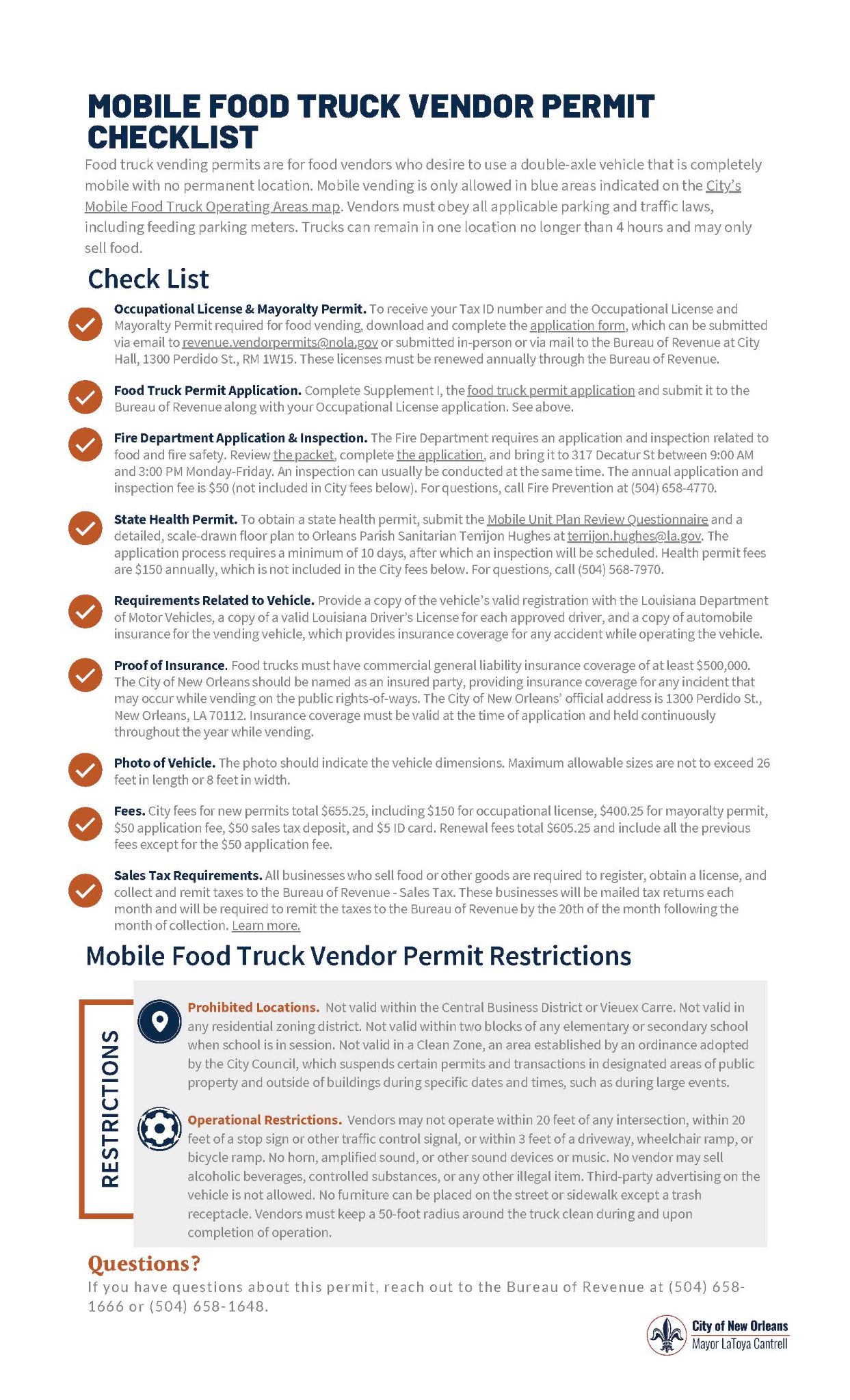89 13.2: Temporary Foodservice Establishments Permit Types
13.2 Temporary Foodservice Establishments Permit Types
Single event permits are usually valid for one food booth at one specific event, usually 14 consecutive days from the initial effective date. Fees will vary according to event type and state or local municipality issuing the permit. Event stakeholders and vendors will also need to secure insurance to cover any food or injury arising from the event.
Multiple event permits are typically valid for one individual food booth at multiple events for two years from the first effective date, as long as each event doesn’t exceed 14 consecutive days. Fees assessed depend on the location and type of events.

https://commons.wikimedia.org/wiki/File:Food_Truck_at_Latter_Library,_New_Orleans_2.jpg
Mobile Food Unit Permit Types
Understanding state, local, and temporary event rules is essential for anyone operating a temporary foodservice establishment. The permit requirements vary based on the kind of operation, length of food service, and event location. This complicated regulatory environment reflects the diverse nature of temporary foodservice operations and the duty to protect the public while supporting economic development.
Mobile food units must be inspected and approved by the local health department prior to applying for mobile food permits. This may also include approval of construction or renovation plans from the appropriate local and state authorities.
General mobile food permit costs vary according to state and local parishes/counties and cities. For example, in New Orleans, an application fee of $50.00 is required. If approved, the food truck permit fee of $400.25 must be paid yearly. Additionally, an occupational license costs $150.00 and must be renewed annually. Finally, a $50.00 sales tax deposit paid annually and a $5.00 I.D. card fee per card is required.
Specialized mobile permits may include foodservice operations such as ice cream trucks, seafood trucks, and vessels serving alcohol. Each state and local municipality will have differing permit requirements for these operations. Ice cream trucks require additional temperature monitoring equipment and specific storage protocols due to the unique challenges of maintaining frozen products. Seafood vendors must comply with enhanced HACCP requirements due to the high-risk nature of seafood products. Alcohol service requires additional licensing and may restrict food service options.

https://commons.wikimedia.org/wiki/File:Please_tell_me_why_Hot_Dog_is_lucky_here_-_New_Orleans_French_Quarter.jpg
Pushcarts, wagons, and other nonmotorized vessels may have different requirements. For example, New York City requires a Mobile Food Vending License to be obtained from the Department of Health and Mental Hygiene (DOHMH) as a photo ID badge. This license is required before applying for a Mobile Food Vending Permit (inspection decal) which is issued for the food vending unit which will be operated.

https://commons.wikimedia.org/wiki/File:Chewing_Candy_JazzFest_NOLA.jpgSpecial Event and Festival Vendor Permits
Vendors at festivals often operate under temporary permits linked to specific events, which highlights the unique nature of festival operations, foodservice at these events, and the importance of streamlined permitting processes. Event-specific requirements guide individuals or groups wanting to serve food at festivals, fairs, or other special events. Often, special event permits or “vending permits” are temporary permits only valid during the time of the event. The New Orleans Jazz and Heritage Festival, as the only festival in Louisiana legally required to conduct food safety inspections, provides a model for best practices in temporary event food safety management.
Health Department Permits and Certifications
Although state and local health department laws vary, temporary foodservice establishments, food trucks, food carts, and many other food vending vessels will be required to obtain appropriate health department licenses, permits, and certifications. In Louisiana, at least one person in charge must obtain a valid food safety certification, such as ServSafe Manager® or an equivalent program recognized by the state health department. Mobile food trucks, food trailers, and food carts will often require health and fire inspections prior to being granted any health certificates, occupational licenses, or operating licenses. For New Orleans Mobile Food Truck and Permit Licenses checklist, see this link for the following checklist: https://nola.gov/nola/media/Licensing-Regulation/Mobile-Food-Truck-Vendor-Permit-Checklist-March-2025v2.pdf.

